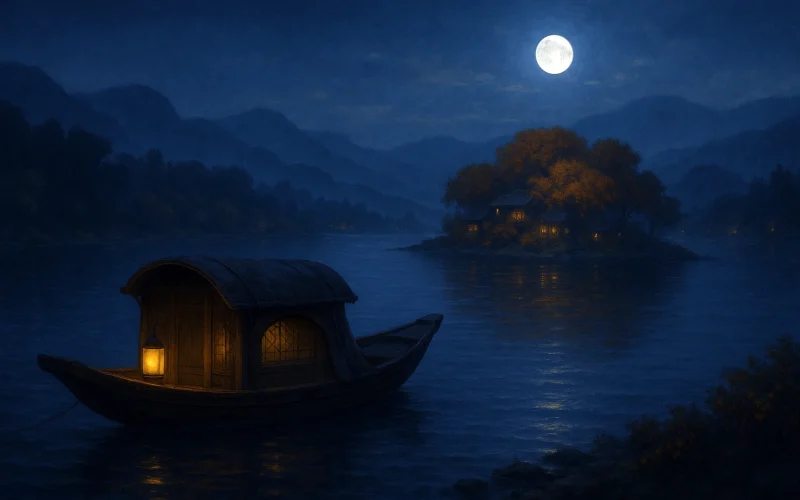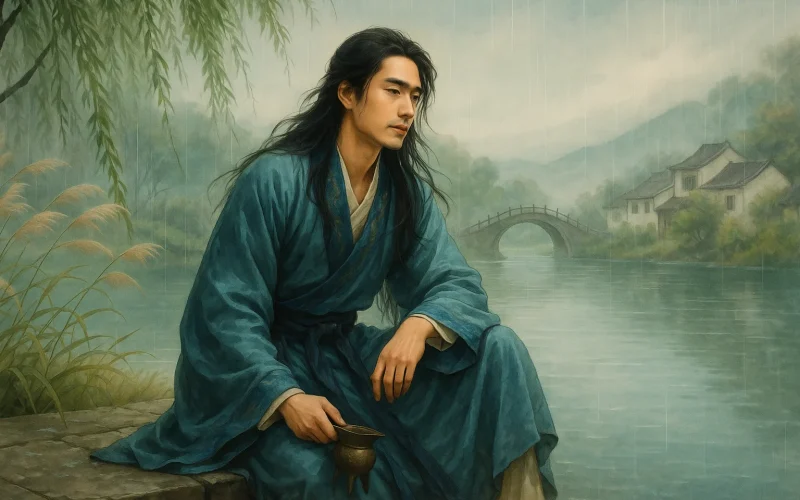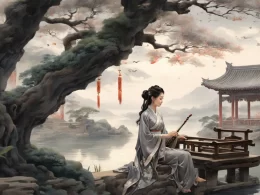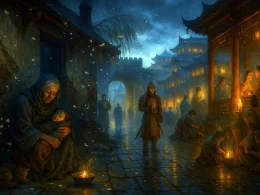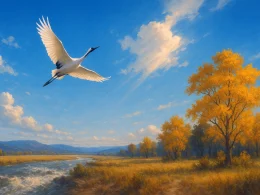O, grass and trees that fringe the pond’s long line!
O, homes that cling to isles where oranges shine!
I seek the wine to warm the chilly air,
Too spent to write—my brush lies idle there.
Year after year, harsh dreams my sleep invade,
While care and grief each step of life degrade.
Wayworn, I pause at earth’s remotest rim,
Yet dawn will find me bound for Suzhou’s hymn.
Original Poem
「泊船吴江县」
刘过
草树连塘岸,人家半橘洲。
暖寒寻酒去,觉懒罢诗休。
逆境年年梦,劳生处处愁。
天涯倦行客,明日又苏州。
Interpretation
Liu Guo lived during the Southern Song Dynasty**, a period marked by political turbulence and complex social conditions, with his own official career fraught with setbacks. This poem depicts the tranquil scenery of Jiangnan's water towns while reflecting the poet's wandering, toilsome life and inner contemplations. Wujiang County (modern Suzhou region), renowned for its picturesque waterscapes, served as the poet's temporary refuge where he immersed himself in nature. Through ordinary landscapes, the work expresses profound emotions, revealing the poet's dual mentality—both his love for nature and his anxieties about worldly affairs.
First Couplet: "草树连塘岸,人家半橘洲。"
Cǎo shù lián táng àn, rén jiā bàn jú zhōu.
Lush grasses and trees fringe the pond's banks,
half the houses nestle among orange groves on the isle.
These lines paint a quintessential Jiangnan waterscape with fresh, natural strokes: shimmering waters, verdant vegetation, and scattered households—an idyllic, secluded haven far from worldly clamor. The poet not only captures the region's serene beauty but also conveys his longing for peace and momentary solace during his travels. The verbs "fringe" (连) and "nestle" (半) demonstrate his meticulous observation of the land and village structure, revealing a tender gaze deeply attuned to nature.
Second Couplet: "暖寒寻酒去,觉懒罢诗休。"
Nuǎn hán xún jiǔ qù, jué lǎn bà shī xiū.
Between warmth and chill, I seek wine to dispel gloom,
but lethargy takes hold—my poetic impulse wanes.
Transitioning from scenery to the poet's state, this couplet connects the physical sensations of shifting weather to his psychological and active response. "Seeking wine" underscores his futile attempt to drown sorrows, while "lethargy" and "waning poetic impulse" reflect exhaustion from prolonged hardship—not mere idleness but a weariness born of accumulated burdens. The poet's mood, as changeable as the weather, dictates his creative energy, laying bare his mental fatigue amid life's struggles.
Third Couplet: "逆境年年梦,劳生处处愁。"
Nì jìng nián nián mèng, láo shēng chù chù chóu.
Adversity haunts my dreams year after year,
toil fills every corner of life with sorrow.
This couplet forms the emotional climax, using stark parallelism to lay bare the poet's anguish. "Adversity" (逆境) intertwined with "dreams" (梦) suggests unrelenting hardship, even in sleep. "Toil" (劳生) paired with "sorrow" (愁) universalizes the link between labor and grief. Here, the poet abandons natural imagery for direct confession, his plainspoken despair mirroring the rootless existence and era's instability felt by late-Song scholars.
Fourth Couplet: "天涯倦行客,明日又苏州。"
Tiān yá juàn xíng kè, míng rì yòu Sūzhōu.
A weary traveler at the world's edge—
tomorrow, yet again, I depart for Suzhou.
The closing couplet contrasts "world's edge" (天涯) with "Suzhou" (苏州), spatial opposites highlighting the loneliness of exile and the era's restless mobility. "Weary" (倦) deepens the exhaustion from the preceding lines, while "tomorrow, yet again" (明日又) underscores the inevitability of continued wandering—a fate he cannot escape. The subdued ending lingers, encapsulating both personal plight and the dynasty's decline with resonant restraint.
Holistic Appreciation
This poetic work, set against the backdrop of Jiangnan's water-town landscapes, presents a refreshingly serene pastoral scene while profoundly reflecting the poet's complex inner emotions. The language is unadorned and natural, with vivid and delicate imagery that combines meticulous depictions of natural beauty with profound contemplations on life's circumstances. The poet seamlessly blends his own state of mind into the scenery, creating a harmonious unity of scene and emotion that expresses both a yearning for tranquil living and a resigned yet thoughtful acceptance of life's adversities. The concluding lines, with their portrayal of travel-weariness and a sense of rootlessness, sketch a feeling of life's transience, highlighting the poet's dual sentiments of love for nature and lament for life's hardships. The entire poem masterfully interweaves scene and emotion, its plainspoken language brimming with sincerity, rich in the flavors of daily life and philosophical depth.
Artistic Merits
- Fusion of Scene and Emotion: The poet excels at merging natural landscapes with personal feelings, where descriptions of scenery are not only vivid and concrete but also carry profound emotional and philosophical weight.
- Unadorned, Natural Language: The poem employs simple, straightforward diction, eschewing ornate rhetoric yet effectively conveying complex states of mind and showcasing the power of genuine emotion.
- Subtle and Introspective Mood: Details like the shifts between warmth and cold, or the act of idly setting down one's brush, reveal the poet's delicate psychological fluctuations and reflections on life's circumstances.
- Tight Structure with Clear Progression: The four couplets are rigorously structured, with the first half focusing on scenery and the latter transitioning into emotion, creating a natural and smooth emotional progression.
- Profound Imagery: Beyond depicting the concrete beauty of Jiangnan, the poem uses scenery to express life's rootlessness and resignation, blending realism with philosophical insight.
Insights
This poem reminds us that even when life is filled with adversity and toil, we must retain our ability to perceive natural beauty and pursue inner tranquility. Through his nuanced emotions and authentic life experiences, the poet shows us that life is a journey inevitably marked by weariness and resignation, yet it is precisely within these small, fleeting moments that true beauty and meaning reside. We should learn to find our own moments of peace amid the rush and bustle, to appreciate the beauty of nature and daily life around us, and thereby attain solace and balance in our hearts.
About the Poet
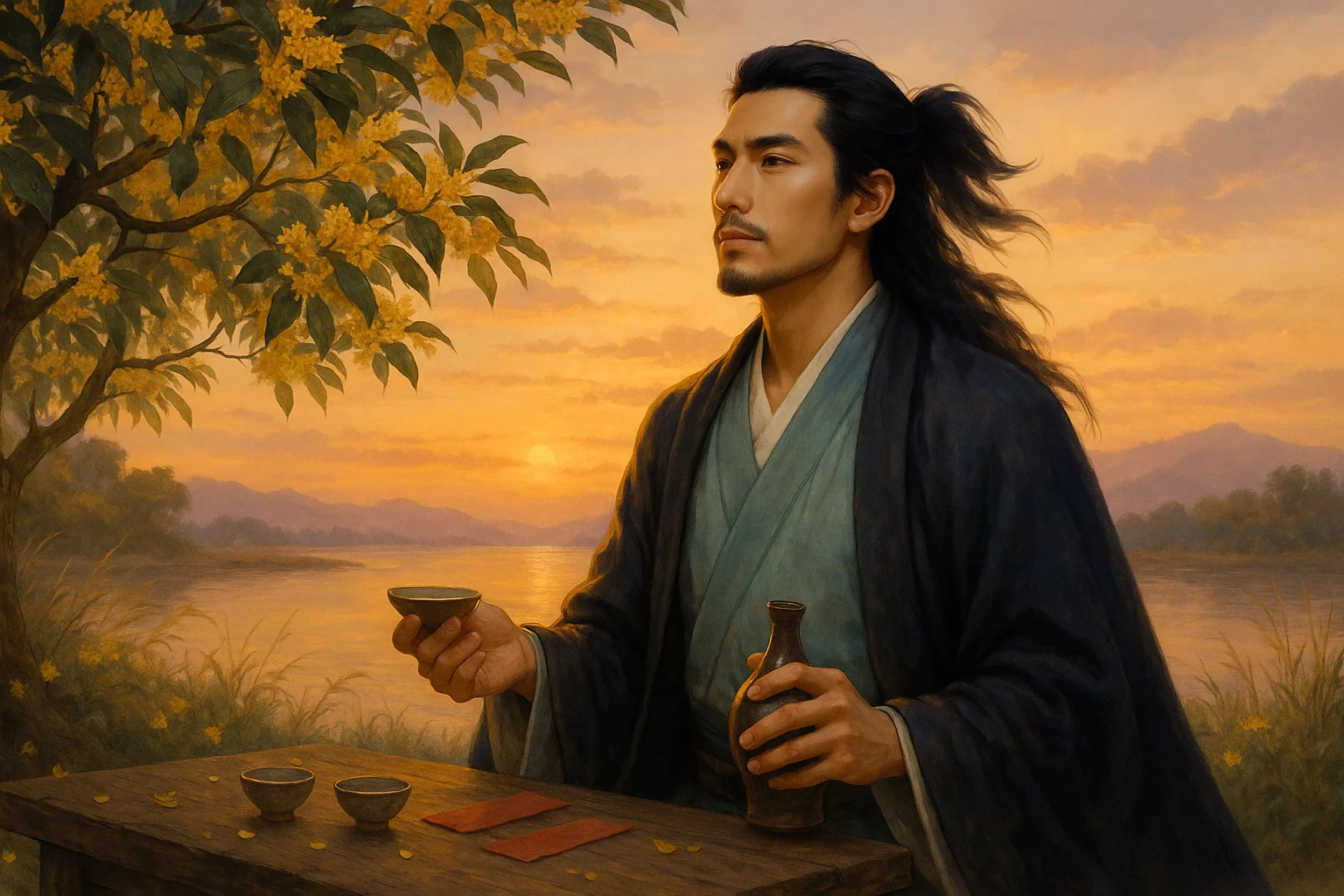
Liu Guo (刘过 1154 - 1206), a native of Taihe in Jiangxi, was a ci poet of the Bold and Unconstrained School (haofang pai) during the Southern Song Dynasty. Though he remained a commoner all his life, wandering the rivers and lakes, he associated with literary giants like Lu You and Xin Qiji. His ci poetry is impassioned and heroic, and his verse is vigorous and forceful. Stylistically close to Xin Qiji but even more unrestrained, Liu Guo became a central figure among Xin’s poetic followers.






